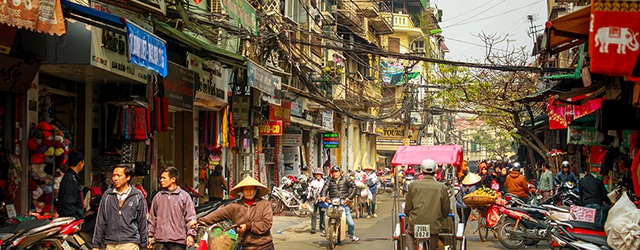
|
CONS |
|---|
|
Overdependence on exports; fragmented and undercapitalized banking sector |
|
Weak IP enforcement; retroactive tax assessments |
|
Inconsistent regulatory interpretations and unclear laws |
Five years ago, Vietnam was still recovering from the global financial crisis and consequent stock market crash. Its banking system was so overloaded with bad loans that failure seemed possible. Vietnam had a weak currency after several years of high inflation.
Since then, the country’s economic picture has changed. “It’s not a 360-degree turn, but things have progressed at a good steady pace,” says Michael Yeo, research manager at IDC Financial Insights. The banking sector is stronger and better regulated. “There are definitely tighter restrictions on lending,” Yeo says. In recent years, inflation has ranged from a low of 0.6% to a high of more than 4%, averaging just under 3% per year.
The country, in turn, has become a more attractive destination for investors. In 2017, Vietnam attracted net FDI inflows of $14.1 billion; and GDP growth passed 7% in the first half of 2018.
Some boosters believe Vietnam qualifies as a new Asian Tiger—a term usually applied to the fast-growing economies of Singapore, Taiwan, Hong Kong and South Korea. Such praise might be somewhat premature, cautions Sebastian Eckardt, lead economist for Vietnam at the World Bank: “They still have some way to go to follow the pathways of countries like South Korea that managed … to achieve high income.”
Economic drivers for Vietnam include free-trade agreements: Vietnam has more than any other country in Asia except Singapore, Eckardt says. At time of writing, a trade deal with the EU awaits final approval. Free-trade agreements have contributed to Vietnam’s strong export base, driven in turn by an expanding manufacturing sector—especially in textiles, footwear and electronics—and aided by a labor force that is still relatively cheap despite several minimum-wage hikes.
Still unclear is the possible impact—if any—the trade dispute between China and the US will have on Vietnam as a manufacturing site. “We don’t see much of it in the data yet,” Eckardt says. “It might be too early to see.” Anticipating trouble, some companies have gone ahead and shifted manufacturing from China to Vietnam. “Wages in China are rising, and wages in Vietnam are competitive; so you already had factories basically relocating even before the trade war,” Eckardt says.
Vietnam is not alone in hoping to benefit from uncertainty in China, however. Despite steady increases, it lags regional competitors such as Thailand and Cambodia in productivity. FDI shows slow steady growth, but investors remain concerned about corruption, weak infrastructure and a shortage of skilled labor.
Even if these issues are surmountable, success brings its own set of challenges, as China’s recent history demonstrates. China famously suffers from an overheated real estate market and massive overbuilding of condominiums, many of which sit empty, as companies have focused more on speculative property developments than on core businesses such as manufacturing. Vietnam itself enjoys a rapidly improving real estate market today—a happy circumstance, but perhaps one that bears close watching.
Vietnam’s economy continues to mature. Although the country retains aspects of a communist government, its doi moi economic strategy, now in place for more than 30 years, froze collectivization, and favors a combination of private enterprise and FDI.



